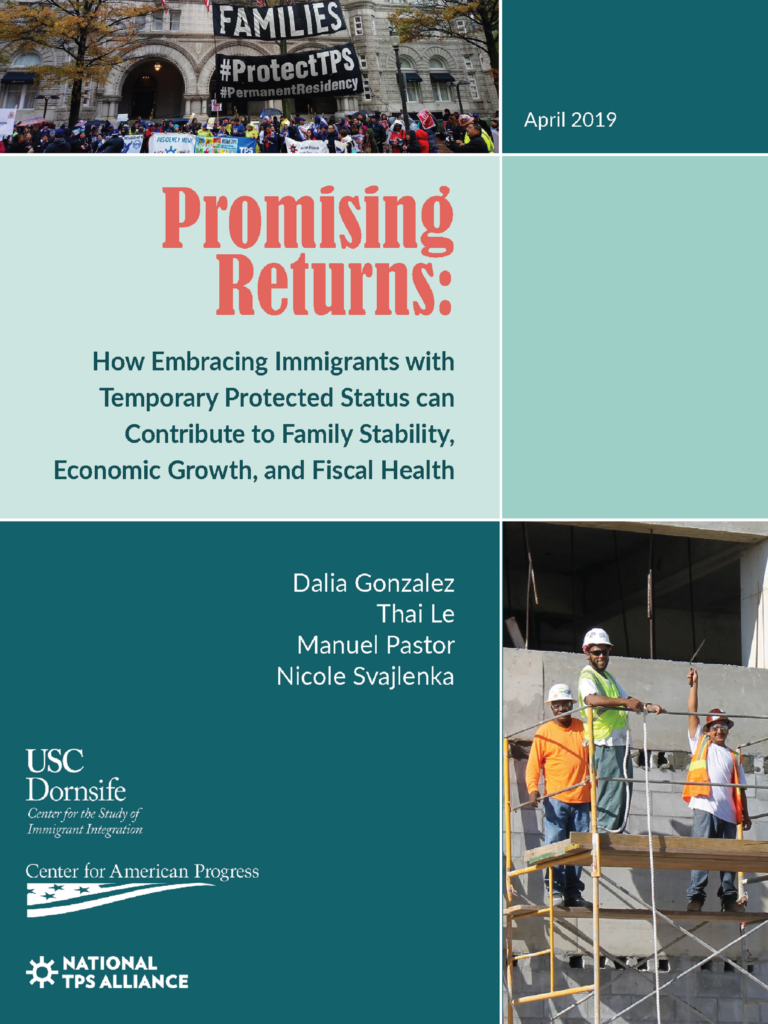
April 15, 2019
By Dalia Gonzales, Thai Le, Manuel Pastor, and Nicole Svajlenka
Please note: reports dated earlier than June 2020 were published under our previous names: the USC Program for Environmental and Regional Equity (PERE) or the USC Center for the Study of Immigrant Integration (CSII).
The Center for the Study of Immigrant Integration (CSII) at the University of Southern California (USC) released a new research brief with the Center for American Progress (CAP) titled, “Promising Returns: How Embracing Immigrants with Temporary Protected Status can Contribute to Family Stability, Economic Growth, and Fiscal Health.”
With the continuous announcements to terminate Temporary Protected Status (TPS) and Deferred Enforced Departure (DED), immigrant families are at risk of deportation. This series of announcements started in 2016 with the decisions to terminate TPS for Guinea, Liberia, and Sierra Leone. It continued in 2017 with the decision to terminate TPS for six more countries, and later in 2018 with the decision to end DED: decisions that have since been contested.
While the immigrant community and organizers have contested these decisions, resulting in lawsuits and status extensions, fear and anxiety in the immigrant community persist. Many of these individuals with TPS or DED have been in the United States for quite some time, as some of the requirements for these statuses necessitate individuals to have been present in the United States as early as the 1990’s. As a result, many individuals with TPS have long records of working hard, purchasing homes, and even establishing businesses. And they are not alone: they are also forming and raising families, and so nearly a million individuals currently live in households in which at least one family member has TPS.
While it has been a stressful and chaotic time for TPS and DED recipients, recently introduced legislation like the Safe Environment from Countries Under Repression and Emergency (SECURE) Act of 2019 and the American Dream and Promise Act of 2019 may potentially provide relief. For the purposes of this brief, we focus on the American Dream and Promise Act of 2019 which would include current TPS and DED recipients as well as individuals who are eligible for TPS but have not registered for the program.
To capture the human stories behind the numbers, CSII collaborated with the National TPS Alliance, an organization led by TPS beneficiaries from across the United States. Through semi-structured interviews, the National TPS Alliance interviewed three TPS recipients in Nebraska, New York, and Texas. In all three interviews, individuals expressed excitement and hope for a path to permanent residency.
Key Findings
To highlight the potential implications of this bill, we use our most recent estimates of all eligible TPS recipients (referred to as Promise Act individuals throughout the brief) under this bill to provide data on households, contributions to state GDP, mortgage and rent payments that help sustain local housing markets, tax contributions, and labor market composition.
- Some of our findings show that if passed, this bill would impact nearly 1.3 million people who have or are eligible for TPS themselves or live in a household with a family member who is eligible under the Promise Act. We also estimate that Promise Act households contribute more than $35.2 billion to the country’s GDP and more than $4.6 billion to federal, state, and local taxes.
- Promise households also help prop up our housing market: We estimate that the total sum of annual mortgage payments from Promise Act households is more than $1.5 billion on an annual basis while the total annual sum of rent payments from Promise Act households exceed $2.8 billion.
- In regards to the labor sector and individuals eligible under the Promise Act, the industries with the highest presence of Promise Act workers are construction, accommodation and food services, administrative and support and waste management service, manufacturing, retail trade, and health care and social assistance. As shown through these results, the Promise Act could help the United States significantly retain rather than lose these economic contributions.
While the American Dream and Promise Act of 2019 is only one piece of legislation, it is nevertheless a start to introducing policies that protect the current TPS population and expand the circle of those who could benefit and contribute. This could result in significant gains not only for the immigrant community, but for the United States as a whole.



